5 Symptoms of a Bad Oil Pump (and Replacement Cost)
The oil pump lubricates a running engine by supplying it with oil. This lubrication prevents metal-on-metal contact and overheating.
Even though the oil pump may seem heavy duty, it can fail over time. It’s important to recognize the symptoms of a bad oil pump so you can replace it and avoid more expensive repairs down the road.
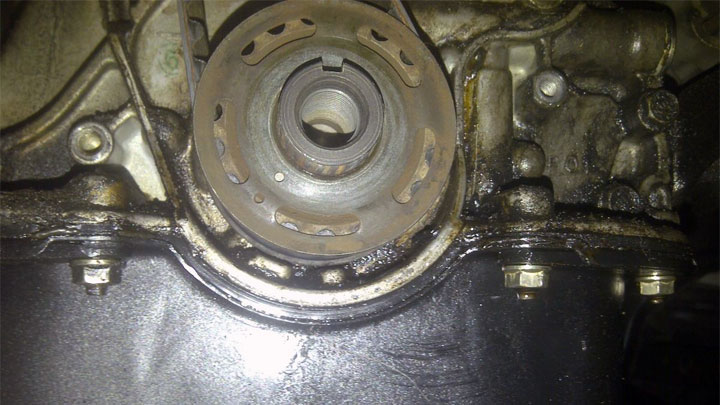
Top 5 Bad Oil Pump Symptoms
There are many symptoms to look for when the oil pump goes bad. Some of the common symptoms are: noise from the valve train, strange noises from the hydraulic lifters, reduced oil pressure, a hotter engine, and a noisy oil pump.
Usually, the oil pump doesn’t get servicing until it actually starts to fail. Once it does, it’ll quickly damage your engine.
#1 – Low Oil Pressure/Oil Pressure Warning Light Comes on
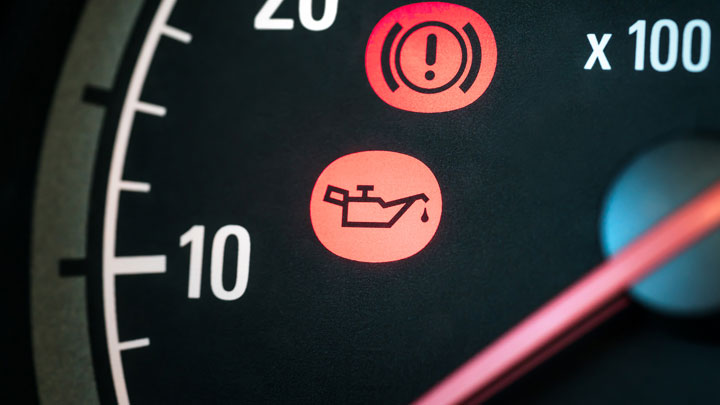
Oil pressure is regulated by the oil pump. When the oil pump goes bad, oil pressure will start to decrease while in the engine. Usually, the first sign of decreased oil pressure will be on your dashboard when the low oil pressure warning light turns on.
Once this happens, check to see what your oil level is. If it’s too low, add more oil until the oil level is normal again. In the event your oil pressure is still low after this, it means the oil pump is bad. Replace the pump right away before the symptoms get worse.
Related: DTC P0523
#2 – Increased Temperature in Engine
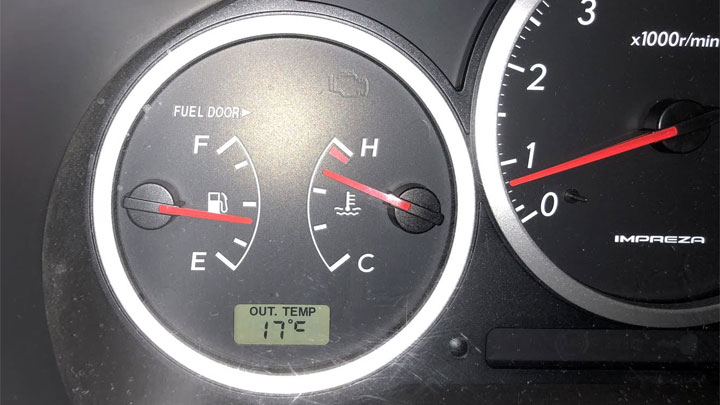
As oil is pumped into the engine, it acts as a lubricant, cooling the engine’s moving metal components. When the engine doesn’t get enough oil, these metal components rub together and produce heat. A warning light on your dashboard to signal that your engine’s temperature is high once enough heat is generated.
Once the engine becomes too overheated, it can cause damage to your engine and its components. Since it would cost thousands of dollars to repair this kind of damage, it’s best to get your car to a mechanic right away once the warning light comes on.
#3 – Valve-Train Noise
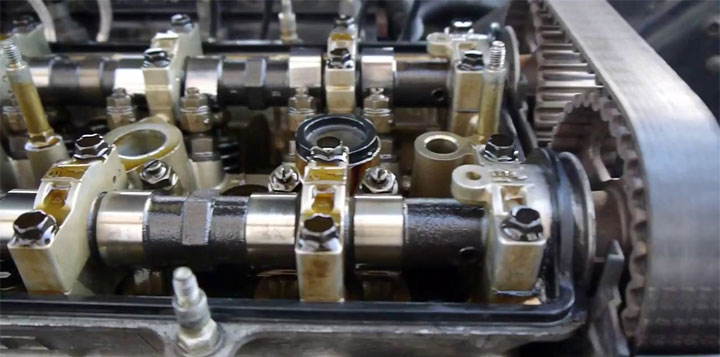
There are critical components in the valve-train system which enable the engine to keep running. Aside from the hydraulic lifters in the valve-train, it also contains push rods, seals, and valve guides. These components all depend on oil to flow through them so they can be lubricated.
When they aren’t properly lubricated due to low oil, these components can seize and stop working altogether. The valve-train will also produce a lot of noise as the oil levels continue to decrease.
See Also: What Does a Rod Knocking Sound Like?
#4 – Oil Pump Noise
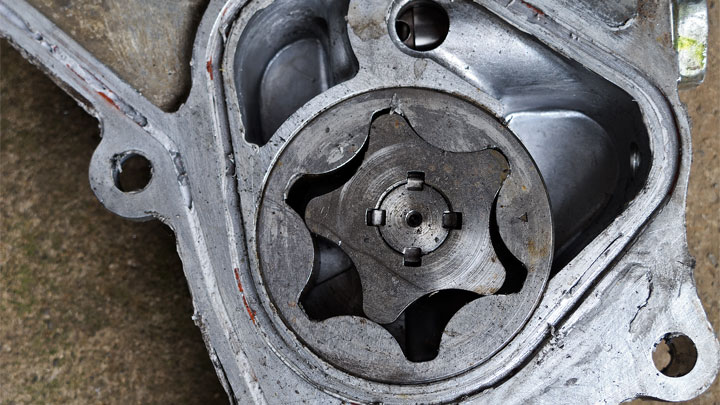
A noisy oil pump is a rare symptom, as oil pumps only make noise when they’re starting to fail. You’ll probably hear a whirring or whining sound when this happens, even when the car is idle.
This indicates the oil pump’s internal gears are worn out, meaning you’ll need to replace the entire pump.
#5 – Hydraulic Lifters Noise

Hydraulic lifters are crucial for sustaining the functionality of your valve-train. These lifters can only function properly when they are lubricated with enough oil. A faulty oil pump will cause oil pressure to decrease to the point where oil can’t flow into the hydraulic lifters of the engine.
This will cause the hydraulic lifters to make noise because they aren’t being properly lubricated. As a result, they will wear out quickly. On some cars, the the type of oil you use has a direct effect on lifter noise.
Replacement Cost of an Oil Pump
Best places to order parts? See: 19 Best Online Auto Parts Stores
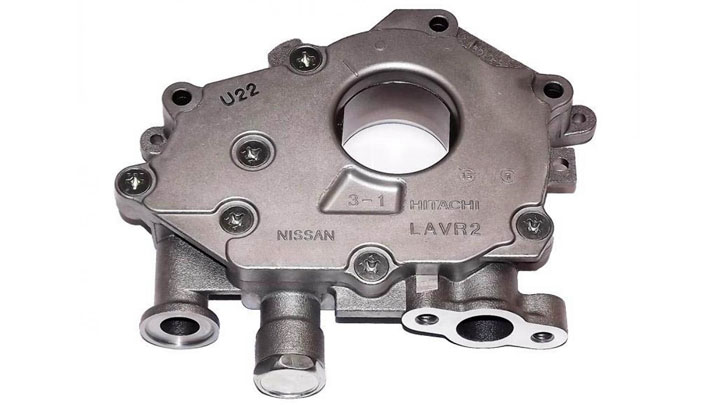
The two main costs you’ll have when replacing an oil pump are the parts cost and then the labor cost for replacing the old pump. You could always install the part yourself to save money, but a mistake could make things much worse. A new oil pump will cost you anywhere from $100 to $300, depending on the make and model of your car.
As for labor costs, it will generally run around $200 or $300, since it takes a few hours for the mechanics to complete this type of job. Therefore, the total price you can expect to pay for an oil pump replacement is $300 to $600.
Maintenance Tips
The oil pump is made to be durable so it should last you for years. However, like all manufactured car parts, they will eventually wear out with age. That’s why you should pay attention to the oil pressure and heat in your vehicle at all times.
Never assume that overheating is caused by the radiator without checking for proof. A noise coming out of your engine is a clear warning sign that the oil pump is in trouble. This noise means that oil isn’t flowing into the engine’s components to lubricate them. Always change your oil pump if you notice these symptoms occurring.
- Replace the Engine or Replace the Car? (11 Factors to Consider) - Apr 11, 2024
- Plastic Piece Dragging Under Your Car? (What It Is and What To Do) - Mar 21, 2024
- Timing Belt vs Timing Chain (What’s the Difference?) - Feb 27, 2024

Hello
My golf 1 has a problem with the oil pump. Even if I replace, I always get the low oil pressure warning light. Now I dont know if it is the type of pumps that I buy or there another underlying issue as these pumps malfunction
Are you sure it’s the pump and not a sensor?
Insightful article, I love reading it. My opinion though, the introductory paragraph talks of functions of engine not oil pump.
Thanks for the feedback. The oil pump is like the engine’s “heart” that pumps oil around it.
I have a Hyundai Elantra 2005, it was making noise from camshaft side when the valve cover was opened, it was seen that the timing has jumped by one chain link and the was slack, the adjuster wasn’t strong either. The chain, adjuster, chain guide and the inlet cvvt gear was changed. Everything was fine as the car was first started but when the engine warmed up the noise started spontaneously and when the timing was checked it was still okay but the chain was still slack. Could that be oil pump not powerful enough to enhance the adjuster. Pls, I need your expertise advice. Thanks.
It is the work of the cam chain tensioners to keep the cam chain under correct tension. Some cars have hydraulic tensioners and other cars the tensioners have to be manually adjusted. I would have a look at the operation of the tensioners first and then at the oil pump for correct pressure. If the oil pump is suspect you might have some hydraulic lifter noise.
Hello
I’ve got an 09 Durango, that the oil light comes on at low rpm, it goes back to normal with a little gas, I’ve changed the oil sensor, it stop for a bit but now has come back, lots of power in the engine, and no noticeable change in water temp. Is the pump failing or could the pick up is dirty. Just wondering what you thought.
Most oil pumps are driven by the crankshaft, which means oil pressure increases as engine speed increases.
If oil pressure appears low at low RPM, there could be a restriction that is overcome at higher pressure. The best way to tell if your oil pressure is actually low is to do an oil pressure test with an external gauge. The factory manual should have a specification for how much oil pressure the engine needs at idle. If you can’t find the spec there, check the Durango forums.
That’s what my ranger did before it went out
hi guy
I replaced an oil pump three month ago because of the oil light was displaying on the dashboard , within three month there’s noise of lifters and I have been told to buy oil pump again because the oil light didn’t disappear. is it right to buy oil pump or he must check the lifters.
I would get that oil light diagnosed. It is possible the cause of the oil light was not the oil pump. You may want to run an oil pressure test to make sure you are getting adequate oil pressure. If you are, I would suspect the oil pump is OK.
2002 chevy silvarado 1500 4×4 oil pressure stared to drop up and down then my power went low as well. Would this be oil pump or something else.
It could be. Normally oil pressure does drop with RPMs though. Any check engine lights? What was your oil pressure after it dropped, and what was your RPM at that time?
I need help for oil test then I know my real problem
Are you interested in a used oil analysis? Companies like Blackstone Labs can take a sample of your oil and tell you the wear characteristics of your engine, and what the recommended oil change interval should be.
My 07 suzuki xl7 started alerting me that my oil pressure was low turn off engine. Only when idling tho. I checked oil levels and it was perfect. So given I just bougbtvthe suvi had my oil changed that still didnt fix it. I’ve read that this model is known for the pick up tube or screens falling off or screen being clogged and of course a bad sensor or pump itself. I’m a single mother of 7 trying to figure this out and get it fixed for as little as possible . I’ve had 2 people tell me that if it’s the oil pump I might as well sell my car for parts because timing chains and crap is involved making it a huge job. So it’s just not worth it. I got screwed buying this car already…I paid 1800 for it and the guy is refusing to give me the title . So either way I’m screwed but which is my best option? Is it possibly the pump is good and it’s a sensor? Thanks in advance. .live becca
Hi there, can you help out please. How much to pay if a machanic has to cleans the oil pump pressure only plus labour?
I’m not really sure what “cleans the oil pump pressure only” means, so I can’t really give you an accurate estimate. It would be best to call a few local shops for a quote.
I have a 2009 chevy silverado 1500 with the 5.3 my oil pressure usually stays around 40 or 50 psi I just got through with taking the motor down to the block for a 3rd time for number cylinder lifter collapsing now that I have it all back together took it for a test drive during test drive notice if I wasn’t accelerating my oil pressure would keep getting lower and lower till it dropped completely code says oil pressure switch replaced it still doing g same thing any suggestions
what is the full procedure of removing and replacing the oil pump??
This will depend on the exact year, make, and model of your vehicle. Consult a factory service manual or a repair manual for your specific vehicle to find the full procedure.
Hi im deaf . My car name is Buick Regal turbo 2014 . I have a problem my car is cause oil pump leak look like bad black oil. How much cost for fix oil pump?
It could be in the neighborhood of $600-1200. You’ll have to get a quote from a local shop and see what they say.
I have a 2003 dodge ram 2500 the oil pressure kept going down and up I changed the oil and filter and now the oil pressure is great but it has a knock like a valve could it be the oil pump
Not sure. If you truly had low oil pressure it could be anything. You might need a mechanic’s stethoscope to tell exactly where the knocking is coming from and then go from there.
If the knocking is coming from the top end it’s probably valvetrain noise. If it’s coming from the bottom end it may be something more expensive like rod knock.
I have a 2005 Envoy Denali with a 5.3 motor .I got low oil pressure when you start it when you give it some gas it goes back up when you let it idle it goes back down does this mean my oil pump is going bad.
It could be. Check your oil to rule out a low oil level. I wouldn’t drive the vehicle unless you absolutely have to until you figure out if it’s the oil pump. A failed oil pump can cause catastrophic engine damage.
I have a 2002 dodge durango 5.9 4×4 that’s doing the exact same thing…I’d like to know for sure if this is a oil pump issue..only thing is..I heard a metal grinding noise at the back of the oil pan and a whirring or whinning noise.
Can the symptoms cause a knock? The person i bought my 97 k1500 from said, “It was a rebuild. Bored 30 over pistons to match. Crank was 10 over. New roller cam and lifters. New radiator. Took off the oil cooler lines. They continued to leak even if they were new. Replaced with solid vertical housing to fit a bigger filter.” Not sure what might be wrong.
A bad oil pump could cause a knock, yes. If your oil pump is bad, oil will not circulate through the engine properly causing excessive wear and catastrophic damage.
I have a 2010 Audi A3 2.0T Hatchback, how much would an oil pump replacement be? I don’t know if it’s the oil pump but I do hear gurgling noises sometimes 5-10 min after just turning the engine off, but no signs of overheating on the gauge whatsoever. Any help please on what it could be ??
I think you will be looking at roughly $1,000 to 1,500 for an oil pump replacement. Before going that route, I would make sure the fault is with the oil pump. Do some testing or have a mechanic inspect the car before putting that kind of money into a part that may not be the root cause of your issue.
An oil pump failure often leaves you with low oil pressure, so you would probably see a light on the dash. Low oil pressure can destroy an engine very quickly.
I have a 2001 Lincoln Navigator and I think I need to replace the oil pump! How much think it will cost
The oil pump for your car will likely cost between $100 and $200 for the part itself and probably another $400 to $600 for labor. It’s a good idea to get estimates from a few shops to find the best deal.
I have a 2005 chevy avalanche 4wd needs an oil pump, what is an around figure to repair this?
It will probably sit somewhere in the neighborhood of $600-1000 if you take it to a shop. The pump itself can be had for less than $150 if you can replace it yourself.
I have a 1990 Chevy pickup it show low oil on the gauge and the oil is level is good but the oil pressure is low on the gauge I can’t figure it out
Please see: http://cartreatments.com/oil-pressure-light/
If you have a 1990 k1500 idk how many miles are on it but they are known to be high clearance motors. I bumped up to a 15/40 weight oil on mine years ago on the advice of an awesome old school mechanic. We knew the drivetrain was in great condition otherwise. Great advice, the truck is still running strong with over 350k miles on it, and it’s been at least 150k since I switched to the heavier weight oil.
I have a Mitsubishi 4g54 b2600 1988 it seized so I reground the crank replaced rings bearings oil pump and put it together and it won’t suck up oil . Then the chain snapped.
I will have to take off my timing chain to get to my oil pump, how much will that cost .
Oil is not getting to the lifters and the top of the engine in a 427/390 hp corvette engine, but the oil pressure gauge shows 60 psi. The distributor is installed correctly as the engine starts and runs (with a lot of noise) This is suddenly after running several thousand miles without and apparent problems. Please help if you can.
Nice article. One tid bit of information missing that I’d have liked to have seen…. How long does an oil pump typically last for? 300,000km? 200,000km? 150,000km? etc
oil pump is not fast moving parts. generally when your engine always keep maintenance well and always drive in procedure way, it will take long life span.
I can’t say I’ve ever seen an worn out oil pump except on worn out engines. Maybe not the case for newer vehicle. Idk. If your oil pump has failed your engine is worn out too. Think about it.
Now in the case of a rebuilt engine yes entirely possible.
Oil pump Working
Hello 05 Chrysler sebring